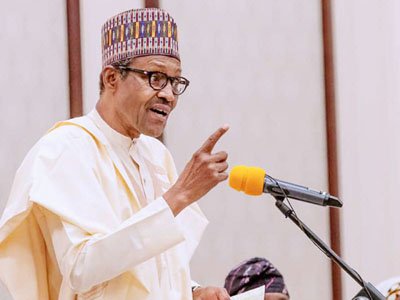In another bold move to check the excesses of state governors, President Muhammadu Buhari, yesterday, announced the abolition of the practice whereby state governments release appropriated recurrent expenditure due to the judiciary and the legislature in the budget but warehouse the capital components.
The move comes on the heels of the release of the guidelines on local government funds by the Nigerian Financial Intelligence Unit (NFIU) which pegged disbursement from the accounts of the third tier of government across the nation at N500,000 daily.
The NFIU ‘Guidelines to Reduce Vulnerabilities Created by Cash Withdrawals from LG Funds throughout Nigeria’, released penultimate week, were geared at stopping governors from tampering, using illegal withdrawals, with LG monies through the controversial Joint State/LGA Accounts.
These dual moves are seen as capable of sanitising financial management at the state level with possible attendant consequences, as President Buahri is set to commence his second term of office.
A communique released, yesterday, after a two-day ‘Retreat On Strategies And Modalities For the Implementation Of Financial Autonomy Of State Legislature And State Judiciary’, organised by the Presidential Implementation Committee On Autonomy Of State Legislators And State Judiciary, said, “The current practice in some states where appropriated Recurrent Expenditure due to the Judiciary and the Legislature in the budget is released to the Judiciary and the Legislature and the Capital components are warehoused in the Executive is hereby abolished.
A source in government told Sunday Vanguard that the new regime was endorsed by Buhari in line with the anti-corruption posture of the administration, specifically in a bid to checkmate state governors.
“The anti-corruption posture of the administration motivated the development to stem the practice that has seen governors tampering with LG, the legislature and the judiciary funds over the years”, the source added.
The communique noted that though there were various levels of compliance since the law on the autonomy of the legislature and the judiciary came into effect three years ago, the release of budgetary allocations by states to their legislature and the judiciary stagnated at between 0.6 and 4.89 percent.
The document sighted by Sunday Vanguard said: “There are various levels of minimal compliance in various states but all fall short of the expected compliance, as budget performance across 36 States of the Federation show that whilst the least allocations to the state Judiciary in the past three years was 0.6 percent of the budget of the entire state, the highest allocation was 4.89 percent.
“To address the anomaly, the federal government asked governors as the heads of the Executive Arm of Government to begin full implementation of the financial autonomy granted the Legislature and the Judiciary.
“It also urged the governors to adopt the budgeting model operating at the Federal level where the sum due to the Judiciary and the Legislature is captured as first line Charge in the Budget laid before and passed by the Legislature.
“It also requested that from now on, the total sum, both Capital and Recurrent, approved in the annual budget of the state, be released monthly on a pro–rata basis by the Accountant General of the State, directly to the heads of the legislature and the judiciary, and heads of judicial service committee or commission”.
The document went on: “That the budgeted sum, Capital and Recurrent howsoever described, be released to the Judiciary to be spent by the Judiciary on the projects, programmes and capital development of the Judiciary, including recruitment and training of personnel. And also so for the Legislature.
“That the current practice in some States where appropriated Recurrent Expenditure due the Judiciary and Legislature in the budget, are released to the Judiciary and Legislature and the Capital components are warehoused in the Executive is hereby abolished.
“That the Model Budget Template of the Judiciary and Legislature, the strata of line consultations and inter Arms, as well as Inter-Agency pre-budget consultations and front loading as already done in some states, be adopted.
“There shall be created a State Allocation Committee comprising the Commissioner of Finance, the Accountant General of the State, the Clerk of the State House of Assembly, the Chief Registrars of High Courts, Sharia Court of Appeal and Customary Courts, the Secretary of the Judicial Service Commission/Committee and the Secretary of the State Assembly Service Commission if any, for the purpose of determining the amount due to each Arm of Government based on the budgetary provision but subject to the funds available to the State.
“The retirement benefit and pensions of judicial officers of Superior Courts of records in the State should be paid by the National Judicial Council as they receive their salaries and allowances from the NJC while in office”.
The communiqué asked all state Houses of Assembly to pass Funds Management Law or Budget Process Law by whatever name called, as a legal framework that will ensure judicious budgeting and use of funds accrued to the State.
It will be recalled that following the assent by Buhari to the Constitution of the Federal Republic of Nigeria, 1999 (Fourth Alteration) in June 2018, granting financial autonomy to states’ legislature and judiciary, the law has been honoured by the various state governments more in the breach than in compliance.
As a result, the President inaugurated the Presidential Implementation Committee on the Autonomy of State Legislature and Judiciary on March 22, 2019 to fashion out a workable national strategy for the implementation of financial autonomy of state legislature and judiciary in accordance with the provisions of Section 121(3) of the Constitution of the Federal Republic of Nigeria, 1999 (fourth alteration), whereby funds appropriated to the two tiers of governments at the state level are released to them directly.
Credit: Vangu



Comments are closed, but trackbacks and pingbacks are open.